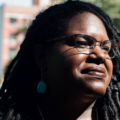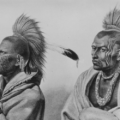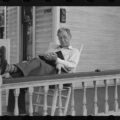Shields: A poem founds the world it finds

Editor’s note: The following essay is excerpted from Of Silence and Song, a book of essays, fragments, and poems forthcoming from Milkweed Editions (December 2017).
Reading Hesiod on the shuttle bus to the airport. The fields are dead or they’re sleeping. He’d know the difference and what to do in either case. A lot depends on which stars are chasing which stars as they drop behind the earth’s darkness. Some swallows and some finches live in the airport, living on the crumbs of travelers. Hesiod is very clear on when it’s safe to travel. It’s when “a man thinks that the leaves at the top of the fig-tree are as big as the footprint a crow leaves as it goes.” There are some trees in the airport that may or may not be real; none are fig-trees, I don’t think. None of the birds are crows. It’s funny when you don’t understand the advice. Maybe “funny” isn’t the word. It’s strange not to know what it is you’re being protected from.
Heraclitus says, “Learning many things does not teach one to have an intelligent mind.” He says, “The teacher of most people is Hesiod; they think he knows the most—he who did not know what day and night are: for they are one.”
Day and night, summer and winter, hour and eternity; fig and figment, sun and moon, foot and the print it leaves behind; life keeps slipping into death and death into life; dream and memory and memories of dreams; stars and steam, here and there. I guess opposites are two sides of the same fact. It’s hard to know what side of the fact you’re facing—hiding behind the shield, or staring at the image emblazoned on its face. Learning many things does not teach you how to be on both sides of the shield at once.
Leaving my family once again to go and talk to others about poetry. My first lesson is that poetry brings us within what we love most, or would love, or must love, or learn to love. I say these words while far away from those I love. My second lesson is that a poem founds the world it finds, and is entirely its own.
After landing, after having come down the walkway, I find myself once again in the no-place of an airport terminal, not quite the same as the one I left from, not quite different either. A man is leaning up against a bar, dread-locked, eyes behind horn-rimmed glasses closed. His t-shirt says Know Yourself.
Alexander the Great traveled through the world carrying with him a copy of Homer’s Iliad prepared for him by his teacher, Aristotle, and a knife. The dangling modifier makes it seem the knife helped prepare the poem; some errors are deeper than revision. Alexander slept with both under his pillow, poem and knife. Aristotle slept inside his head, I guess, lecturing in dreams about the soul at work and its happiness. “Traveled” is here a euphemism for the terror of bringing war to people who did not know you even existed. “You” is here a euphemism for an invading army. The army marches over the horizon line with a pillar of dust over it so that in the right light it looks like it is made of the flames it is bringing to your home; but it’s just the dirt kicked up by hooves and heels. A good way to know something is to kill it and then study it; things are easier to describe when they do not move. When asked why he holds the poems of Hesiod in such low worth, Alexander answered, “Quite the contrary, but he is perhaps not fit for kings and generals.” Hesiod is for “shepherds, carpenters, and farmers.” He gives advice on how long the axle of a wagon should be, and how large the wheel; he says nothing about how best to throw a spear so that it kills two men at once, how much it should weigh, how sharp the bronze should be. Though the answer is simple. Very sharp.
What is fit for a king is to learn how to rule men and end their lives if they don’t obey; all those others can learn how to nourish it. I found Homer put into my hands when I was little more than a boy. I passed all the tests I was given. Diomedes wounded Aphrodite and Ares. Achilles loved Patroclus. The girl’s name was Briseis. Athena jumped out of her father’s head ready to do battle; she’s the goddess of Wisdom. No one ever gave me Hesiod. I guess my teachers knew I wouldn’t become a shepherd.
When I read in the news that the man in Kalamazoo who went a killing spree was a driver for the taxi service Uber, and between murdering six people picked up others for fares, I couldn’t help but picture in my mind Diomedes ranging the battle field in his chariot, stopping sometimes to talk with friends and foes, telling some stories, discovering an enemy was actually an old family friend, trading armor with him, and then driving off to kill more people. Such a remarkable feat of killing was called an αριστεια, or “display of excellence.”
What one wants is a shield. “One” here is a euphemism for I. The word in English derives from the Germanic and at its root means to divide, to separate. The shield is what stands between who I am and who I’m not. In ancient Greek the word is ασπις. Used as a substantive, it means so simply a man bearing a shield, as if there were no difference between a man and a shield, as if they were a single thing, neither alive nor dead, but somehow both, alive and dead, at once. Emerson says, “Cause and effect are two sides of one fact.” So may it be of before and after, other and self, enemy and friend; the front of the shield bearing on it some image—a lion, Fear, Strife, a snake, the Gorgon—and the back of the shield, imageless, but with straps to hold onto, they are two sides of the same fact.
But shields trouble the mind—pursuing the violence they protect us from, so that, as of night and day, the opposites become one. Sometimes learning breaks the mind, and intelligence begins its mourning. Then I think of the shield not as seven layers of ox-hide bound, nor chased metal, not even as the gold handiwork inlaid with bone of the lame god, but as something so thin it is nearly transparent, and it stands between us and all things which with we’d converse. Then love and fear are two sides of the same fact, and thoughts just arrows the shield turns aside. Nothing hits its mark. The ground is littered with trivia; I mean, littered with bullet-casings and the abandoned shafts. Mostly the damage is collateral. So thin is the shield it can pass through us without causing a wound. It severs into halves the brain, keeping apart the hemispheres which, some neurologists claim, in ancient times remained connected, and the electric spark between the lobes let us hear gods speak. But the shield silenced those voices; now we mostly hear our own voice, a kind of echo effect, called consciousness.
Of the long description, so detailed as to be almost impossible to imagine, that Hesiod gives to the shield of Herakles, none causes me more trouble than Death-Mist who, with mucus flowing from her nostrils and blood dripping from her cheeks, stands among the Fates as they battle over the body of one man. The man is nameless; just a figure on the shield.
Other sorrows and astonishments abound.
In the middle of the shield “was Fear, made of adamant, unspeakable, glaring backwards with eyes shining like fire.” So much strains the mind. Fear “looking backward” means he is trying, unspeakable god, to look behind him at the one carrying the shield. “Around the rim ran Ocean, and it looked as though it were in full flood; it held together the whole richly worked shield.” As Hesiod describes the shield, so Strabo, following Homer, describes the world entire—Ocean surrounds the land, Ocean is the limit of all. One could say of the shield that it is an image of the world. In the center of the world stands Fear; the edge is all Ocean.
Over Fear’s head flies Strife, who takes away the minds of men. Murder is there, and Slaughter. Fate drags men by their feet through the battle, “holding one who was alive was but freshly wounded, another who was unwounded, another who had died.” Twelve snakes writhe. Lions and boars whose black blood drips from their wounds to the ground. There the Centaurs rushing to fight men, all in silver, holding golden fir trees in their hands for weapons. The battle horses of grim Ares and Ares himself, “giving orders to foot-soldiers, purple with blood as though he were slaying living men.” Apollo plays music on his golden lyre. The Muses, those Pierian bees, “looked as though they were singing piercingly.” Perseus, slayer of Medusa, fine horseman, was “neither touching the shield with his feet nor far from it—a great wonder to observe, since nowhere was he attached to it. For that was how with his skilled hands the renowned Lame One had wrought him, made of gold.” He carries in a bag on his back the head of Medusa, and her Gorgon sisters rush after, their footsteps sharp on the adamant surface of the shield, making in their anger a great noise, seeking revenge. Men fighting and men slain; women tearing their cheeks in sorrow; old men gathered at the city gates holding up their hands in supplication; the spirits of the underworld opening their mouths to drink the falling blood. The Fates, all three. Death-Mist among them. But also men singing in chorus; a bride in a wagon being led to her husband; a great wedding song rising up from the shield, where “men sent forth their voices from their soft mouths.” Men dancing and laughing beside the pipe-player. Plowmen cutting their lines in the dark earth. Men cutting down the corn stalk bent over with the weight of their seed. Other harvesting vines, carrying the grapes, treading them, and others “drawing off the juice.” Men wrestling, boxing. Some on the hunt with their dogs. And other men racing chariots in an arena, ceaseless in their toil, the dust endlessly clouding the gleam of their armor and the flanks of the swift horses, none ever winning the victory they chase.
It must have been hard to lift, that shield, weighing as much as the world; and as of the world, so of the shield, that in the effort to describe it—from wedding song to brutal death, from sowing the field to Fate’s reaping, from the bride’s to the supplicant’s band, from Fear to Ocean’s edge—we speak ourselves past our ability to see, and the work of imagination becomes unimaginable. Then, as does Fear himself, we try to look behind ourselves, and see what it is we lost, and grit our teeth.
I call that living. Living behind the shield. Somehow what we lost is before us, turned away from our eyes; somehow what we’ve lost we’re holding in our arms.
I can imagine a gesture of utmost peace, but I’ve never seen it happen, nor read of an account. A person, anyone really, maybe everyone at some point must, tries to take account for herself all that makes her world a world. A catalog of existence. This work that begins as thought ends in some speaking or making; I mean to say, as soon as she says a word, the hammer strikes the metal, pounding into shape the shield. She might say I have a husband and a black dog; two girls; a house with a spruce that shakes with the spring wind and the winter; a car with a broken antenna; songs still singing in the air the children’s chorus sang; a wounded god who came back to life; a goose that flew behind me low to the ground which I feared in all its anger; and baby goats that when I ran through them chased after me, leaping with their buds of horn into the summer air. I should say that I married this shield. I mean, I married they one who bears it. She married my shield, too. I can imagine in the midst of battle—in the living-room, in the classroom, in the park—seeing another shield coming toward you, the Gorgon with her lidless eyes and the snakes her furious hair, and what turns silent in you then, what then turns to stone, is not your body but your intent, and instead of entering into battle you stop running, drop whatever weapon is in your hand, and taking your arm from out the straps you turn your own shield around and offer it to your enemy. To accept yours, he must offer his own. And it’s only then the miracle occurs, word whose definition might more properly mean the wonder of anything seen. You see for the first time the world you’ve been carrying. Can walk up to it. Can see so quietly chased into the bronze sky the clouds even now gently blowing across it. Can run your fingers along the cursive line of your daughters’ hair made most of flaxen light. Finally you can see why it tired you so to carry your shield, so full it is of the life you’ve lived, this life you’ve hidden behind. Maybe there your own eyes stare back out at you, image of yourself you made but lived blindly behind, and so you seem for a brief time to finally obey the oracles command, to know yourself; but it’s so different than you thought, not a knowledge of your own mind whose belief turns to doubt and whose thinking hides away some inner process occurring almost it seems by itself, but only seeing another person hold up the image you have made of yourself, and you feel so strangely less burdened. Not that you’re at the center of this world. You might be hard to find. Not the hero or the god, just the lone figure in the far field where the rain comes down and bends over the head of the seed-heavy poppies; there you are, right there at the edge, just a few lines hastily sketched, where the ocean circles the whole world, and you recognize yourself by some attitude or posture, that relation each of us has to the world we’ve carried before us but have never seen, most often called departure.
Though I’ve looked at my shield as closely as I can, and though I’ve found crows in trees and crows gleaning in the furrows, and though there are fig trees whose leaves are newly sprung, I’ve yet to find anywhere on this dark earth of shining bronze the print of crow suddenly flown. I hope that means I’m not ready to leave; or that Heraclitus is right, and all the opposites are one fact, fear and peace, distance and presence, heart and blood, departure and arrival, husband and wife, parent and child. Then it makes sense that I can know my life only when I’ve given the whole world of it away to another, standing there empty-handed, while in the sunlight the dust falls back down. There’s a word I’ve long wanted to know what it means, this word called love. Now I see the image I haven’t made. There she is, holding the shield in front of her that is my whole life, and above the ocean’s edge, there is her face, not the sun, Kristy, my wife.
Tomorrow I’ll have to make this shield again. I know I will. I’ll have to get ready for battle. Have to be born. Schooled. Taught again by the centaur how to kill and how to cure. Have to be the hero and have to learn again I am no hero. Have to lose first all I want to gain. Have to worry and to pray. To call out to that goddess, Memory, the only one among the immortals who walks through the world naked until she hears her name, and then she dresses in a garment you give her, and the purple robe is named time. Life is the thing you live again and again, waking up each day not in it, but behind it, putting your arms through the straps, asking yourself again, Memory, remind me, how do I give it away? Memory isn’t perfect. Sometimes she tells lies. But of all the gods, she is most kind. She dresses in days that wear her away, and keeps giving away her shield to those who in her keep some faith, that shield called mind.
About Dan Beachy-Quick
Dan Beachy-Quick is a poet and essayist. His work has been supported by the Lannan and Guggenheim Foundations, and he teaches in the MFA Program at Colorado State University.





